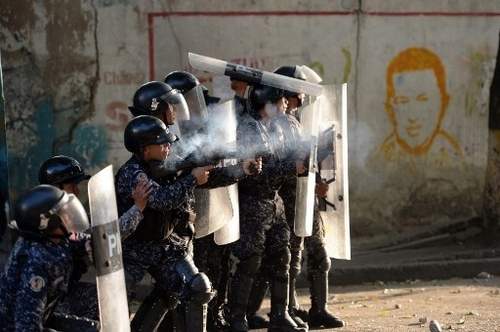

CARACAS, Venezuela (AFP) — Protesters took to the streets in at least 30 different parts of Caracas on Tuesday, just 24 hours ahead of an opposition-called mass street demonstration against Venezuela President Nicolas Maduro, a non-governmental organisation that monitors social conflict said.
Most of the protests took place in socially disadvantaged areas and some involved the blocking of streets and burning of garbage, the Social Conflict Observatory said.
Police used tear gas to disperse some of the crowds, including in the northern Cotiza neighbourhood where a group of soldiers rose up against Maduro on Monday and took over a command post, before they were surrounded by police and military units, with 27 people arrested.
There were also clashes between protesters and the forces of order in the nearby Los Mecedores neighbourhood, where the smell of pepper spray filled the air on Tuesday morning.
“Maduro out! That’s what the people were shouting. It was awful,” 60-year-old Dinora de Longa told AFP.
“The police were shooting and there was tear gas everywhere. I had to put my grandchildren in the bathroom. This won’t solve anything.”
One protest, in which people pelted cars with stones, took place on the motorway linking Caracas to the neighbouring port of La Guaira, where the capital’s airport is located.

It was a small taste of what may come on Wednesday when protesters are set to rally against Maduro, whom the opposition has branded a “usurper,” and in favour of a transitional government leading to elections.
In Washington, US Vice President Mike Pence issued a rallying call to the opposition, calling Maduro a “dictator.”
“As the good people of Venezuela make your voices heard tomorrow, on behalf of the American people, we say: estamos con ustedes. We are with you,” Pence tweeted.
The anti-Maduro movement, led by National Assembly president Juan Guaido, has gained traction since the former bus driver was sworn in for a second term as president on January 10.
Maduro won highly controversial elections in May that were boycotted by the opposition and dismissed as a fraud by the European Union, United States and Organisation of American States. The opposition accuses Maduro of running an authoritarian regime and acting unconstitutionally.
In 2016 he lost control of the National Assembly, enabling the opposition to challenge his leadership, but the loyalist-dominated Supreme Court stripped the legislature of its powers in 2017.
The National Assembly has been powerless since then but Guaido, who became president of the body earlier this month, has risen to the challenge of taking on Maduro’s iron grip on power.
Wednesday’s protest date of January 23 is significant because it marks 61 years since the fall of Marcos Perez Jimenez’s dictatorship.
The regime has responded by announcing its own demonstration in support of Maduro. It will be the first major street movement since 125 people were killed during civil unrest between April and July, 2017.
Venezuela is suffering the worst economic crisis in its modern history with poverty rising and the country gripped by four years of recession.
Basic necessities such as food and medicine have been in short supply, while spiralling inflation — predicted to reach a mind-boggling 10 million per cent this year — has crippled the currency. The crisis was sparked by a fall in the global oil price in 2014, a commodity Venezuela is almost entirely reliant upon.
Its crude production has dropped to barely a third of its level a decade ago.
























